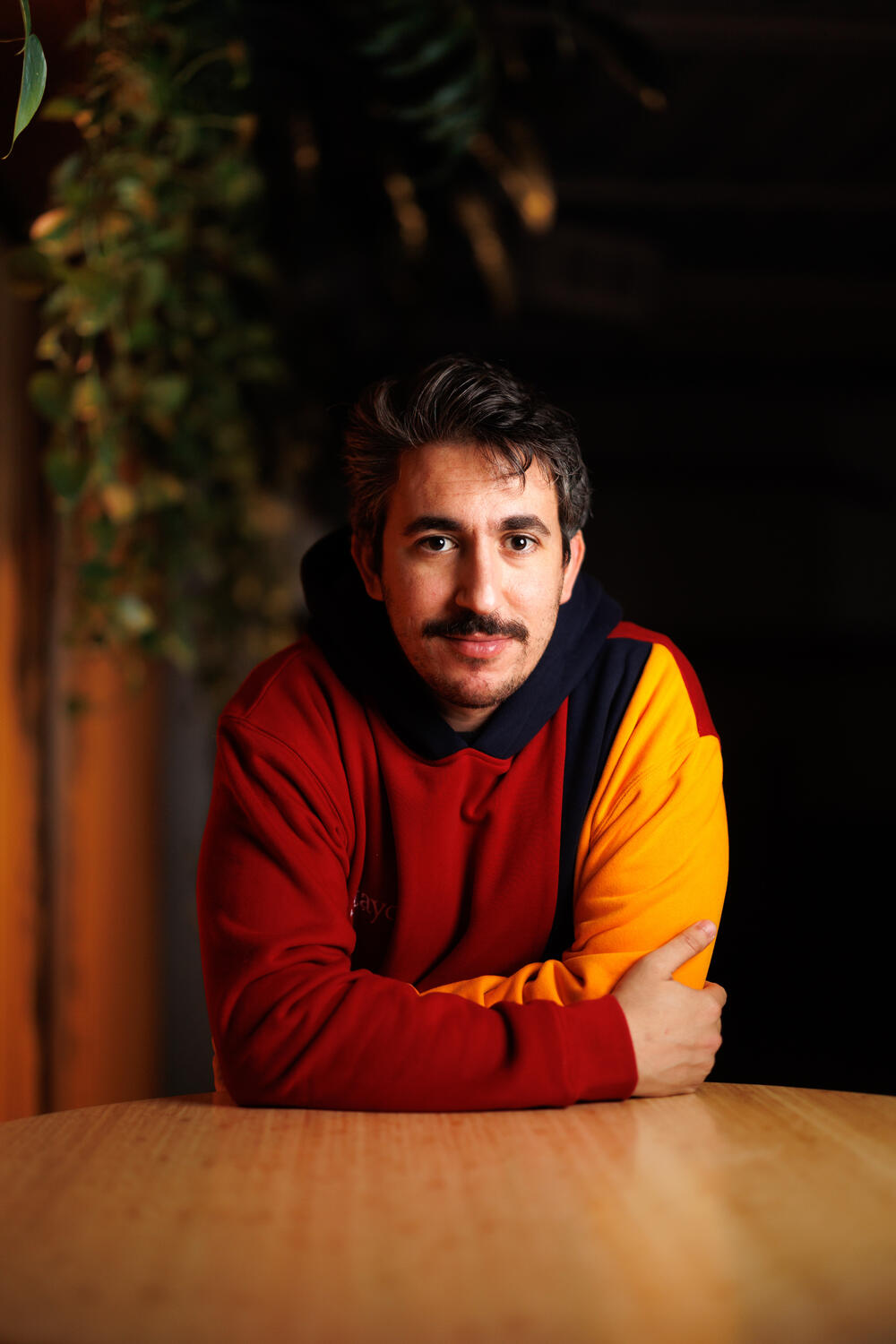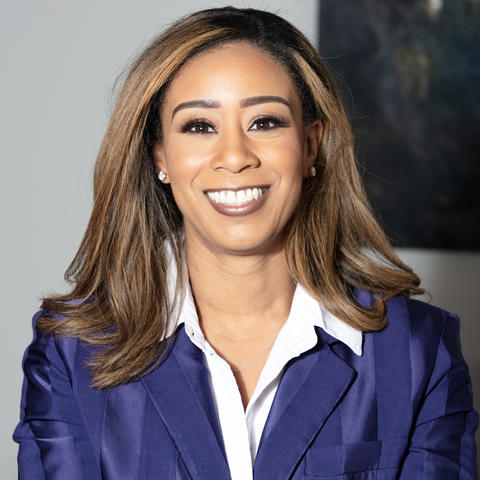
Section Branding
Header Content
Comedian Mohanad Elshieky on plot twists, political jokes, and going on tour
Primary Content
Comedian Mohanad Elshieky reflects with GPB's Pamela Kirkland on political satire, absurd headlines, and late-night’s uncertain future as The Late Show with Stephen Colbert prepares to end.

Libyan-born comedian Mohanad Elshieky has made a name for himself with sharp, unexpected punchlines and a perspective shaped by living across cultures.
This weekend, before he takes the stage at City Winery in Atlanta, Elshieky tells GPB's Pamela Kirkland why political satire is getting harder, and what it’s like working behind the scenes at NPR’s Wait, Wait… Don’t Tell Me.
TRANSCRIPT:
Pamela Kirkland: It's Morning Edition. I'm Pamela Kirkland. With the news this morning that The Late Show with Stephen Colbert will end after next season, there's a lot of talk about the future of late night and what it means for political comedy. One person who's worked in that world is comedian and writer Mohanad Elshieky. You may know his name from Colbert's show or from NPR's Wait, Wait, Don't Tell Me. The Libyan-born, New York-based comic brings a sharp outsider's eye to everything from immigrant culture to American life. And he's bringing that perspective, and a lot of laughs hopefully, to City Winery in Atlanta this weekend. He joins me now. Mohanad, welcome to Morning Edition.
Mohanad Elshieky: Thank you for having me, appreciate it.
Pamela Kirkland: I want to start with the Atlanta show. What can folks expect to hear from you when they come to see you at City Winery?
Mohanad Elshieky: Well, first of all, great jokes. Yeah, that's what you're paying for. That's 100%. I mean, this show is mostly a lot of personal stories and whatnot about living in Portland, living in New York, growing up in Libya, all of that stuff, just being in America and all. But like I said, overall, they're just gonna have a great time.
Pamela Kirkland: How would you describe your comedy in your own words?
Mohanad Elshieky: I mean, the way I would describe my stand-up comedy, like you said, it is laid-back, it is chill. I'd say my style is like very plot twisty because I love plot twists. So like every joke has like an ending that is different from what one would expect or like wherever you think the story was going, it's going into a different direction. So I try and do a lot of that, but overall, it was just like pretty chill.
Pamela Kirkland: You mentioned you were born in Libya and now live in New York. How have your personal experiences shaped a lot of your comedic material?
Mohanad Elshieky: Yeah, like you said, I was born in Libya and I feel like I came here to the States like 11 years ago and as an immigrant. So a lot of it is — is looking at America doing outside commentary, like from someone who did not grow up here. So I think it's pointing out the absurd because people like obviously are born here and raised here. So like a lot of the stuff they're like used to. Versus me coming out from the outside. I'm like, "I don't think this is normal." So I think when people see someone like from the outset pointing stuff like that at you, they're like, "oh yeah, I don't think that is normal, too." And it's funny that you're bringing that up.
Pamela Kirkland: You've been in a lot of different spaces where comedy and politics meet, like you were writing and consulting for Love It or Leave It, that podcast. You've done Colbert and written for them. Do you think satire, political satire is doing its job right now? Or is it just harder to keep up with the news because of the fast-paced cycle these days?
Mohanad Elshieky: I think it is hard now, yes. And like you said, I used to write for Love It or Leave It, but now I'm doing Wait, Wait, Don't Tell Me on NPR, and it is. It is hard because sometimes the news is just like very, very ridiculous to the point where it's like, what am I even making fun of here? This is like — and I know it's funny because people are always like, oh yeah, jokes write themselves. I'm like, "No, they do not. They do not write themselves!" They take hours and hours of just looking at the news and being like, what am I even looking at right now? This is, this is bad. Or this is too absurd to even make jokes about. I think, yeah, satire is like, we still need it, but it's just, it is just hard because people are not able to tell about what is real and what's not anymore. So I feel like it's become harder to do satire because people have to recognize it's satire, you know? And now it's very hard to recognize it's satire. So it's just like on you now to make it clear that this is a joke or we're just joking here. This is not what I actually think or this is not the real thought process behind what's being delivered. So yeah, it is doing its job. I feel like we need more than satire, to be honest right now.
Pamela Kirkland: And now you're writing for Wait, Wait, Don't Tell Me, which our listeners absolutely love. What's it like working on that show that's part-comedy, part-current events, and part-quiz show?
Mohanad Elshieky: I love it. It's truly like maybe one of the best jobs I've ever had like in comedy. It's just so fun. The show is like — we, like, obviously it does politics but it does a lot of like also just like silly news and stuff like that. The team itself is like everyone there is like so so nice.
Pamela Kirkland: How is writing for Wait Wait different from prepping for a stand-up performance?
Mohanad Elshieky: I mean the main difference is whether it's like evergreen or like, you know, like you're doing now news. Like I feel like Wait, Wait, Don't Tell Me you do the joke now. Next week, it's — it's old news. You can't do it again. For stand-up, like, OK, it has to be fresh because I'm on tour. I'm doing it for like months and months too. Like, I'm doing it until the end of the year. I like people have to find these jokes funny no matter what the time frame is. So that's why it's, it is — it's different. And honestly, I do — like, standup is always going to be the most enjoyable art form for me. I think the fun part about standup, is that if a jokes does well, it's — it's you who wrote it. It's you on stage. If it doesn't, you also have to take the brunt of that. But that's, why it is — it is fun. There's always that risk of like where, especially with new jokes or like, or being at a new place, uh, you're like, "OK. I don't know how this joke is gonna go," so when it does well, it's like a very, very great feeling.
Pamela Kirkland: Mohanad, thank you so much for speaking with me.
Mohanad Elshieky: Thank you for having me.
Pamela Kirkland: Mohanad Elshieky will be at City Winery in Atlanta on Sunday, July 20. You can find more of his work and tickets online at mohanadelsheikhi.com. This is GPB.

